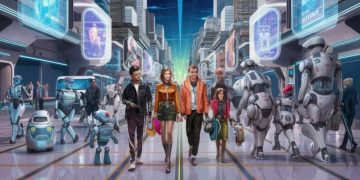The Role of US Government in Shaping the Future of Work: Policy Updates

The Role of Government in Shaping the Future of Work in the US: Policy Updates involves a multifaceted approach, including legislation, funding, and initiatives that address technological advancements, workforce development, and labor market dynamics to ensure a fair and prosperous future for American workers.
The future of work in the United States is undergoing a seismic shift, driven by technological advancements, demographic changes, and evolving economic landscapes. In this dynamic environment, the role of government in shaping the future of work in the US: policy updates becomes increasingly crucial. These updates are not mere policy adjustments; they are foundational shifts that will redefine how Americans work, live, and thrive in the coming years.
Understanding the Evolving Landscape of Work
The modern workplace is markedly different from what it was even a decade ago. Automation, artificial intelligence, and the gig economy have transformed traditional employment models. This evolution requires a proactive approach from the government to ensure that workers are not left behind.
To fully grasp the scope of governmental influence, it’s essential to understand the forces reshaping the labor market. Let’s delve into some of these key factors:
Technological Disruption
Technology continues to advance at an unprecedented pace, automating routine tasks and creating entirely new industries. This shift necessitates continuous learning and adaptation for workers to remain competitive.
The Rise of the Gig Economy
More Americans are engaging in contract work, freelancing, and other forms of non-traditional employment. This trend presents both opportunities and challenges, requiring policies that address issues like benefits, job security, and worker classification.
Demographic Shifts
An aging workforce, increased diversity, and changing educational attainment levels are reshaping the labor pool. Government policies must account for these shifts to promote inclusivity and economic opportunity for all.
Here are some key challenges that need to be addressed:
- Ensuring workers have the skills to thrive in a technology-driven economy.
- Providing adequate social safety nets for those in non-traditional employment arrangements.
- Promoting equal opportunities for all workers, regardless of background.
The government is exploring various policy interventions to address these challenges, including investments in education and training, reforms to labor laws, and initiatives to promote entrepreneurship.

In conclusion, understanding the evolving landscape of work is crucial for effective policy-making. By addressing the challenges and opportunities presented by technological disruption, the gig economy, and demographic shifts, the government can play a pivotal role in shaping a more inclusive and prosperous future for American workers.
Key Government Policies and Initiatives
Several government policies and initiatives are already in place to address the challenges and opportunities presented by the changing nature of work. These initiatives span across various departments and agencies, reflecting the multi-faceted nature of the problem.
Understanding these essential measures is key.
Workforce Development Programs
Federal and state governments invest in workforce development programs aimed at providing workers with the skills they need to succeed in high-demand industries. These programs include job training, apprenticeships, and career counseling services.
Investing in Education
Recognizing the importance of education in preparing workers for the future, the government is increasing funding for STEM education, vocational training, and lifelong learning initiatives.
Labor Law Reform
The existing labor laws are being reviewed and updated to reflect the changing nature of work. This includes addressing issues such as worker classification, minimum wage, and benefits for gig economy workers.
Government programs have been created. Here are some examples:
- The Workforce Innovation and Opportunity Act (WIOA) aims to improve the quality and relevance of workforce development programs across the country.
- The National Apprenticeship System provides funding and support for apprenticeship programs in high-growth industries.
- The Department of Labor offers various resources and programs to help workers acquire new skills and find employment.
The impact of these government policies and initiatives is significant. By investing in workforce development, promoting education, and reforming labor laws, the government is helping to create a more skilled, adaptable, and inclusive workforce.
In summary, these policies and initiatives are crucial for equipping American workers with the tools they need to thrive in the future economy. Through strategic investments and reforms, the government aims to ensure that every worker has the opportunity to succeed.
The Role of Legislation in Shaping Work’s Future
Legislation plays a crucial role in defining the parameters of the future of work. New laws can address emerging challenges and provide a framework for businesses and workers to navigate the changing landscape.
Understanding its various forms is essential.
Promoting Worker Rights
Legislation can protect workers’ rights, ensure fair labor practices, and promote safe working conditions. This includes measures such as paid leave, equal pay, and protection against discrimination.
Supporting Innovation
Laws can incentivize innovation and entrepreneurship by providing tax breaks, funding for research and development, and streamlined regulatory processes.
Addressing the Gig Economy
Legislation can clarify the legal status of gig workers and ensure that they receive adequate benefits and protections. This includes addressing issues such as minimum wage, overtime pay, and access to healthcare.
The following legislative opportunities exist:
- Develop comprehensive data privacy laws to protect workers’ personal information.
- Invest in infrastructure projects to create jobs and stimulate economic growth.
- Expand access to affordable childcare and eldercare services to support working families.
Enacting effective legislation requires a collaborative effort between lawmakers, businesses, labor unions, and other stakeholders. By working together, these groups can create policies that benefit both workers and the economy as a whole.
To summarize, legislation is a powerful tool for shaping the future of work. By promoting worker rights, supporting innovation, and addressing the challenges of the gig economy, lawmakers can create a more prosperous and equitable future for all Americans. It’s fundamental to ensure they are engaged in the process.

Challenges and Criticisms of Government Interventions
While government interventions can be beneficial, they are not without their challenges and criticisms. Stakeholders often voice concerns about potential unintended consequences and the effectiveness of various policies.
Review of such intervention is useful.
Bureaucracy and Inefficiency
Government agencies can be slow to adapt to changing circumstances, leading to bureaucratic delays and inefficiencies. This can hinder the implementation of new policies and reduce their effectiveness.
Unintended Consequences
Government interventions can sometimes have unintended consequences that harm workers or businesses. For example, regulations that are too stringent can stifle innovation and job creation.
Ideological Differences
Different political ideologies can lead to gridlock and prevent consensus on important policy issues. This can result in inconsistent or ineffective policies that fail to address the root causes of the challenges facing workers. Despite the challenges, the government continues to evaluate and improve its interventions. This includes streamlining regulations, conducting rigorous evaluations of policy effectiveness, and engaging in open dialogue with stakeholders.
There are some possible risks, such as:
- Overregulation that stifles innovation and job growth.
- Inefficient spending on programs that do not produce meaningful results.
- Political gridlock that prevents the passage of necessary legislation.
The government is also exploring new approaches to intervention, such as public-private partnerships and outcome-based funding models. These approaches can help to align incentives and ensure that resources are used effectively.
In conclusion, while government interventions are essential for addressing the challenges facing workers, it is crucial to carefully consider the potential challenges and criticisms. By addressing these concerns and adopting new approaches, the government can maximize the effectiveness of its policies and create a more prosperous future for US workers.
The Impact on Small Businesses and Entrepreneurship
Small businesses are the backbone of the US economy. Government policies have a significant impact on their ability to thrive and create jobs. It is important to consider how these policies affect small businesses and entrepreneurship.
There is a requirement to encourage growth and foster innovation:
Tax Policies
Tax policies can either encourage or discourage small business growth. Tax cuts for small businesses can free up capital for investment and job creation, while tax increases can reduce profitability and slow growth.
Regulatory Burden
Regulations can be costly and time-consuming for small businesses to comply with. Streamlining regulations and reducing the regulatory burden can help small businesses focus on growth and innovation.
Access to Capital
Small businesses often struggle to access capital to finance their growth. Government programs such as loan guarantees and venture capital funds can help small businesses secure the funding they need.
The government can continue to make changes to provide a positive impact such as:
- Providing targeted tax relief for small businesses in high-growth industries.
- Simplifying regulatory processes to reduce the burden on small businesses.
- Increasing funding for small business loan programs.
Small businesses and entrepreneurs can also play a role in shaping government policies. This includes advocating for policies that support small business growth, participating in public forums, and working with government officials.
In short, government policies can have a profound impact on small businesses and entrepreneurship. By creating a supportive environment, the government can help small businesses thrive, create jobs, and drive economic growth. Collaboration is key and will assist both the government and the business sector.
Future Trends and Policy Recommendations
Looking ahead, several trends are likely to shape the future of work in the US. It will be important to anticipate these changes and develop proactive policies to address them.
Looking forward, consideration needs to be made with regard to policies and trends:
Automation and AI
Automation and AI are likely to continue to transform the workplace, automating routine tasks and creating new job categories. Policies should focus on preparing workers for these changes through education and training.
Remote Work
Remote work is likely to become more common, as technology makes it easier for workers to collaborate remotely. Policies should address issues such as broadband access, data security, and worker wellbeing.
Climate Change
Climate change is likely to have a significant impact on the economy and the workforce. Policies should focus on creating green jobs and supporting industries that are committed to sustainability.
Considering these factors and trends moving forward, there are a few key considerations to explore:
- Invest in infrastructure to support remote work and connect underserved communities.
- Promote lifelong learning and provide workers with opportunities to upskill and reskill throughout their careers.
- Develop policies that address the social and environmental impacts of climate change.
In conclusion, the future of work in the US is likely to be shaped by several trends, including automation and AI, the rise of remote work, and the challenges posed by climate change. By anticipating these changes and developing proactive policies, the government can help ensure that US workers have the tools they need to thrive in the future economy.
| Key Point | Brief Description |
|---|---|
| 👩💻 Skills & Training | Government invests in programs to help workers learn new skills for future jobs. |
| ⚖️ Labor Laws | Reforms address worker classification, benefits, and protections in the modern economy. |
| 🌱 Small Business Support | Policies aim to reduce regulatory burdens and provide access to capital for entrepreneurs. |
| 💡 Tech & Innovation | The government supports innovation through funding for research and development. |
Frequently Asked Questions
▼
The gig economy is a labor market characterized by short-term contracts or freelance work, as opposed to permanent jobs. It’s growing due to tech platforms and changes in work preferences, impacting job security and benefits.
▼
Workers can prepare by continuously learning new skills, especially in technology-related fields. Upskilling and reskilling are essential, along with adapting to flexible work arrangements and building a diverse skill set.
▼
The main challenges include ensuring fair labor practices in the gig economy, providing adequate social safety nets, promoting equal opportunities, and adapting education and training programs to meet changing job demands.
▼
Government policies significantly affect small businesses by influencing tax burdens, regulatory compliance, and access to capital. Supportive policies can encourage growth, while burdensome regulations can hinder innovation and expansion.
▼
Lifelong learning is vital as technology and job requirements evolve rapidly. Continuous education ensures workers remain competitive and adaptable, enabling them to thrive in dynamic and changing labor markets.
Conclusion
In conclusion, the **role of government in shaping the future of work in the US: policy updates** is pivotal. By proactively addressing challenges and embracing opportunities, policymakers can foster a dynamic, inclusive, and prosperous labor market for all Americans. This requires adaptability, collaboration, and a commitment to continuous learning and improvement.





